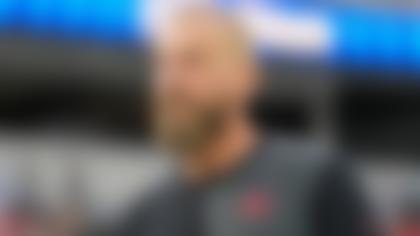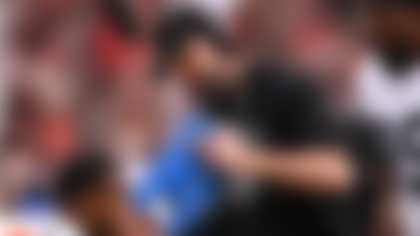The sea of protests and outrage sparked in the aftermath of the killing of George Floyd while in Minneapolis police custody on May 25 has sent reverberations that have transcended numerous boundaries. Many uncomfortable yet necessary discussions have taken place in the days since, with several NFL players and personnel being among the conversation starters.
Saints quarterback Drew Brees became a subject of discussion Wednesday regarding what he perceived as disrespect of the U.S. flag, a perspective that shrouded Colin Kaepernick's peaceful protest against police brutality in controversy in 2016. Brees received intense criticism for his statement, which was widely viewed as him missing the mark on the root of the issue at-hand.
Thursday's edition of NFL Total Access saw the continuation of a roundtable discussion, again moderated by NFL Network's Steve Wyche, surrounding the injustice taking place in America and what the response to it has been and needs to be. This time, Wyche was joined by former NFL coach and player and current Arizona State coach Herm Edwards and the NFL Network's Maurice Jones-Drew and Jeffri Chadiha.
The first topic of discussion was Brees. After citing that Kaepernick's message was "hijacked early" and twisted to the point where the true narrative behind his actions was lost, Edwards commended Kaepernick on what he started and offered his take on what he would do to unite a locker room divided by comments like the ones made by Brees.
"The hard conversation with some players that might have missed the message, that needs to be talked about in a team setting, to be quite honest," Edwards said. "As we know, when you think about social injustice, for some, they've never been involved in that. But for people of color, that is kind of the norm and that is something that has to be talked about."
As a former player and team captain, Jones-Drew was asked how he would go about handling locker room tension. He thought back to the Nov. 2012 killing of 17-year-old Jordan Davis, who was black, by Michael Dunn, a 45-year-old white man, in Jacksonville following an argument over loud music. Jones-Drew said the situation, which occurred in his seventh season with the Jaguars, elicited different perspectives among his teammates but shed important light on the larger problem.
"As a team, we had to come together and understand that everyone has personal views but there's a difference between right and wrong. And I think when you listen to what Drew Brees said, and this is my personal opinion, I may forgive him but I will never forget," Jones-Drew said. "Now, he's in a place where I put him. I understand that I can't go to Drew and really talk to him about my issues of getting pulled over or how I've been mistreated in the community or quite frankly in New Orleans, how the black community is treated. I just understand that he's in that category and yes, we can move forward and yes, there's a respect factor when you're playing football, but I will no longer go to him to kind of air out my problems to him 'cause I know he doesn't want to understand by what he said."
Wyche asked Chadiha if living in a society where everyone has a platform to express their raw emotion via social media has made us all more sensitive to things said by people who we might not agree with. After characterizing Brees as a "good man who said the wrong thing at the worst possible time" and crediting him for his philanthropy, Chadiha emphasized that focus should be placed more on actions, not words.
"I understand the frustration, the pain with the words, but I'm not somebody who's big on words any more when it comes to social justice. I think we have too many people putting out statements, putting out tweets and talking about stuff, and that's not action to me," he said. "… I think when Drew Brees said what he said, again I get the frustration of it, but I think we have to recognize especially as black people, as people of color that, if we're going to have these kinds of conversations, some things are going to be said that are awkward or gonna hurt our feelings or gonna sound bad but necessarily don't have bad intentions. And I think we have to be willing to forgive and be compassionate enough to recognize that if somebody is willing to say I'm sorry and move forward, then he should be forgiven."
The panel moved on from Brees to talk about Colts general manager Chris Ballard, who stated Thursday that he "can't sit here and remain silent" as it relates to the cries for justice and reform in this country. Edwards spoke on how including people from all walks of life is important when seeking change.
"When we think about social injustice and racism, I think there has to be a conversation that's had and the problem with the conversation is if we don't allow different people in the audience, or in the huddle let's just say, if we don't allow that to happen, we can never find the ground to move forward," Edwards said. "You have to sometimes check yourself in life. You choose your friends, you don't allow them to choose you, but who is in that inner circle of friends that you have that are influential. That influence other people and I think there lies the problem. Until we get into that inner circle where we can have this hard conversation, we see no progress."
Jones-Drew classified the dialogue being shared amongst the masses as a sign that society is in "a state of awakening."
"Listening and reading to what GM Chris Ballard said, he's awakened. He's finally realized what is going on. And we've been crying and screaming and players have been protesting and doing things in the community, both black, white, Hispanic, however in the NFL doing things quietly, we just haven't seen that. And I think finally now we're getting further where people are starting to realize what has been going on," he said. "… It sucks that in 2020 we had to watch a man get murdered on television to finally awaken people but that's where we are. So, the next thing for me is after we do all this and we're creating awareness and we're educating everyone and finally people are starting to realize, what are you going to do next?"
As protests continue to ramp up around the world, it's becoming more clear that it'll take some time for the dust to settle. And when it does, it's vital to map out what the next steps will be, as Jones-Drew mentioned. In Edwards' opinion, a lot of strife can be remedied by applying a simple approach. One he garnered from his 30-plus years manning various sidelines.
"When you think about bad policing, it's like coaching," Edwards said. "It's a real simple solution to this. If you're not coaching bad policing, but you're allowing it to happen, that's still on your watch. You can't allow it to happen and when it happens and it rears its head, you have to alleviate the problem. I mean, you look at the situation here with this incident, one of these officers has had problems. Well, he should no longer be on the team 'cause he's going to affect the outcome of how everyone looks at you as an organization. That's the shame of it all. In coaching, we say, it's real simple, 'Either you're coaching or you're allowing it to happen. Either way, you got to fix it.' That's an internal problem. You have enough information on a bad policeman and you still allow him to be on the team. You got to kick him off, he's got to go because he represents 800,000 policemen and everyone looks at those guys the same way now. They're going to paint 'em with a broad brush. You can't allow it to happen and when it happens there has to be swift consequences."












